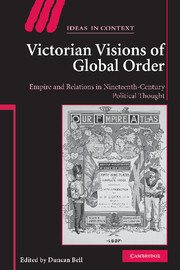 Victorian Visions of Global Order
Victorian Visions of Global Order Published online by Cambridge University Press: 22 September 2009
INTRODUCTION
With the repeal of the Corn Laws in 1846 Britain entered on an unprecedented course for a Great Power. In adopting unilateral free trade, it opened its markets to all the nations of the world equally while seeking no reciprocal benefits. Rather than this heralding simply a new phase in Britain's shopkeepers' mentality, for many this offered the potential to reorder relations between states which industrialisation made possible. Trade – the douceur of commerce – would replace warfare between nations, for rather than representing a zero-sum contest between mercantilist states, the opening of a world market offered the possibility of universal peace. This ambition was voiced by the Conservative architect of repeal Sir Robert Peel, who, in writing to the citizens of Elbing in Germany, urged that ‘by encouraging freedom of intercourse between the nations of the world, we are promoting the separate welfare of each and are fulfilling the beneficent designs of an all-wise Creator’. ‘Commerce’ was, he continued, ‘the happy instrument of promoting civilisation, of abating national jealousies and prejudices, and of encouraging the maintenance of general peace by every consideration as well as every obligation of Christian duty.’ This language, however, was far from that of many of his own former supporters who distanced themselves from what they saw as a supremely misguided and potentially hazardous course, one which was, as Sir John Gladstone put it, ‘pregnant with results that may prove fatal in their consequences’.
To save this book to your Kindle, first ensure no-reply@cambridge.org is added to your Approved Personal Document E-mail List under your Personal Document Settings on the Manage Your Content and Devices page of your Amazon account. Then enter the ‘name’ part of your Kindle email address below. Find out more about saving to your Kindle.
Note you can select to save to either the @free.kindle.com or @kindle.com variations. ‘@free.kindle.com’ emails are free but can only be saved to your device when it is connected to wi-fi. ‘@kindle.com’ emails can be delivered even when you are not connected to wi-fi, but note that service fees apply.
Find out more about the Kindle Personal Document Service.
To save content items to your account, please confirm that you agree to abide by our usage policies. If this is the first time you use this feature, you will be asked to authorise Cambridge Core to connect with your account. Find out more about saving content to Dropbox.
To save content items to your account, please confirm that you agree to abide by our usage policies. If this is the first time you use this feature, you will be asked to authorise Cambridge Core to connect with your account. Find out more about saving content to Google Drive.